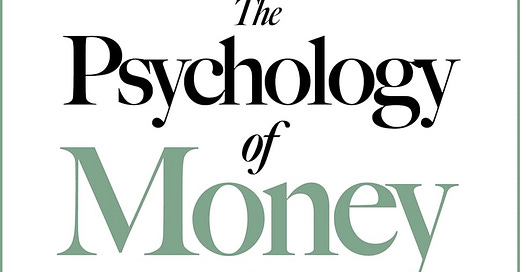A Timeless Guide to Mastering Financial Behavior
Why Understanding Your Emotions and Choices Around Money Is the Key to True Wealth
Money isn’t just about numbers; it’s about emotions, decisions, and human behavior. In The Psychology of Money, Morgan Housel dives deep into the often overlooked psychological aspects of financial decision-making. Designed for anyone curious about how people relate to money—from seasoned investors to everyday spenders—this book is a delightful blend of storytelling and timeless wisdom. It’s not a technical manual but a heart-to-head connection that explores why we think, feel, and act the way we do with money.
What It’s About
The book centers around one core idea: financial success is less about knowledge and more about behavior. Through 20 engaging chapters, Housel uses anecdotes, research, and historical insights to show how personal experiences, emotions, and psychology influence money management. The stories range from a janitor amassing a fortune through patient investing to a millionaire losing everything due to impulsive decisions. The message is clear: mastering money isn’t just about spreadsheets; it’s about self-awareness.
What Makes It Different
Unlike traditional finance books that emphasize strategies, formulas, or market predictions, The Psychology of Money takes a humanistic approach. Housel’s gift lies in simplifying complex ideas through stories that stick. He shifts the focus from external circumstances to internal decision-making, making it accessible, relatable, and thought-provoking.
Chapter-by-Chapter Breakdown
Each chapter is a self-contained story, making the book easy to pick up and revisit whenever you need a perspective reset. Here’s a snapshot of the book’s chapters and key takeaways:
No One’s Crazy: Everyone’s financial choices make sense to them, shaped by their life experiences.
Luck & Risk: Success in finance is as much about luck as it is about effort and skill.
Never Enough: The dangers of constantly moving the goalposts and never defining what’s “enough.”
Confounding Compounding: The extraordinary power of compounding over long periods of time.
Getting Wealthy vs. Staying Wealthy: It’s one thing to acquire wealth; maintaining it requires humility and flexibility.
Tails, You Win: Big outcomes often hinge on a few significant events or decisions.
Freedom: True wealth lies in being able to do what you want, when you want.
Man in the Car Paradox: We’re often drawn to the idea of status, but it rarely brings true satisfaction.
Wealth is What You Don’t See: Real wealth is hidden; it’s the financial cushion you’ve built, not what you spend.
Save Money: The simplest, yet most underrated financial advice: save consistently.
Reasonable > Rational: Personal finance should feel right for you, even if it’s not the most “rational” choice.
Surprise!: Financial planning must include room for the unexpected.
Room for Error: Building in margins of safety protects you from inevitable surprises.
You’ll Change: Your financial goals and values will evolve over time—and that’s okay.
Nothing’s Free: Everything has a price, and the key is deciding if it’s worth paying.
You & Me: Different people approach money differently based on their experiences.
The Seduction of Pessimism: Pessimism feels more convincing than optimism, but balance is crucial.
When You’ll Believe Anything: Be wary of the stories we tell ourselves to justify decisions.
All Together Now: A synthesis of all the lessons, emphasizing balance, perspective, and patience.
Confessions: Housel shares personal anecdotes that highlight the lessons learned in his own financial journey.
Who Should Read This Book?
If you’ve ever wondered why some people effortlessly save while others live paycheck-to-paycheck—or why wealth often doesn’t translate into happiness—this book is for you. It’s perfect for:
Newbies to personal finance seeking foundational wisdom.
Seasoned investors looking for a behavioral edge.
Anyone interested in the intersection of psychology, history, and money.
Readers who prefer actionable insights over jargon-heavy theories.
Final Thoughts
Morgan Housel’s The Psychology of Money is a refreshing take on a topic that often feels dry and overwhelming. By weaving practical advice with deeply human stories, he reminds us that financial well-being starts in the mind, not the wallet. This book doesn’t just change how you think about money—it changes how you think about life.
Rating: 9.4/10
Whether you’re starting your financial journey or are a seasoned pro, this book is a worthy addition to your library. Its lessons are not just timeless but essential in navigating today’s unpredictable world. In short, it’s not just about money; it’s about mastering yourself.
Disclaimer: The information provided is not intended to replace professional financial advice tailored to your unique situation. Despite our best efforts to ensure the accuracy and timeliness of the information presented here, we make no express or implied representations or warranties about its completeness, accuracy, reliability, suitability, or availability. Any reliance you place on such information is solely at your own risk. Please be advised that the content herein is not financial advice. It is highly recommended that you seek personalized financial advice from a professional.




